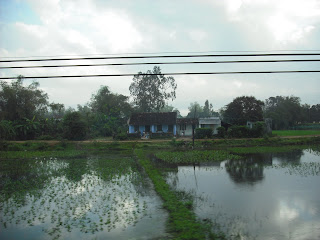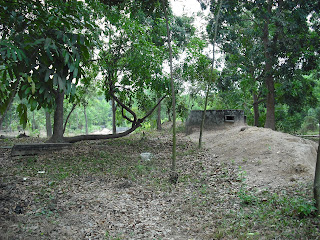

Visited Chris Rolwes' history class at Jefferson High School. The AP students were very attentive and posted the following questions:
2 - You said something to the effect that the people of VN handled the war better than the citizens of the United States, could expand on this?
A: Good question, Corbin. When I was in country I observed that the Vietnamese went about their daily lives of making a living and raising a family without much attention to these foreign devils who would eventually leave after failing to alter their destiny of a unified, independent Vietnam. Their long history is punctuated by foreign invaders who tried, but they patiently passed down the importance of self-determination from generation to generation.
What is the opinion in VN regarding the war and did/do they view it was a victory?
A: It is a tremendous victory. There are many statues of brave men and women and Ho Chi Minh attesting to this. Also, there are several museums of US high-tech weaponry that eventually proved to be inadequate to subjugate a peoples' goal of independence.
When did u deside u wanted to go back to VN?
A: It was kind of a spur of the moment thing in January 2009 when I thought, huh, 40 years ago this month I was winging my way to Vietnam. I wonder how it's doing? When one is retired, these ideas pop into one's head - too much time to think, I guess.
Corbin Beastrom Hour 5 (Comment this)
How could the Vietnamese elections be so rigged? If they were inevitably going to be that lopsided, why hold them at all?
A: Great question, Amy. You read my blog! Way to go! Anyway, Thieu, et. al. knew they didn't have the backing of the vast majority of the Vietnamese people so no way would they have a real election. He had the money and backing from the United States and that's all he needed. To this corrupt government that we backed, perception was everything and substance nothing. They came from a tradition that never understood the democratic process. Power was all that mattered. They could say anything and it was so, just because they had the power. So, Thieu always won with 99% majority.
You mentioned the great deal of foreign investment in Vietnam today; why are they so eager to allow foreign interference today when it clearly did them no good in the war?
A: Vietnam does not consider it foreign interference. They are utilizing foreign technology and equipment which they do not have right now. Also, all these foreign businessmen are spending a lot of money in Vietnam when they come to develop projects as they wine and dine decision makers, etc.
Does the Vietnamese government struggle to trust the United States after everything we put them through? Amy S. Hour 6 (Comment this)
A: The government of Vietnam has established relations with the US. We have an embassy there now and several consulates. They officially trust the US as much as any other country, but are probably hesitant to engage in any kind of a military alliance. They do like US tourists and are encouraging people to travel there.
4 - What was the biggest difference you experienced upon your return?What was your intial emotion when you returned?Shaina L hour 6 (Comment this)
4 - What was the biggest difference you experienced upon your return?What was your intial emotion when you returned?Shaina L hour 6 (Comment this)
A: Vietnam has gained in population and it actually seemed more crowded with the cities teeming with motorbikes on every street. By the way, there is a law now that every motor scooter or motorbike operator must wear a helmet. 40 years ago nobody wore helmets. The other difference I saw were all the hotels that have been built as well as other high-rise apartments under construction. My initial emotion was sadness that American hubris led it to think it could make this country bend to our will and it cost 58,000 lives.
5 - What was your duty in Vietnam?Why did you join the military?Did you gain anything from your war experiences and your recent return to Vietnam?Sidney H hour 5 (Comment this)
5 - What was your duty in Vietnam?Why did you join the military?Did you gain anything from your war experiences and your recent return to Vietnam?Sidney H hour 5 (Comment this)
A: My duty was light weapons infantry, at first. I kept my nose clean and did my duties and advanced eventually to sergeant in charge of a 81mm motor section. I didn't join the military. I was drafted. I gained the knowledge that I could adapt to a challenging disruption in my life. On my return a learned that Vietnam has done very well without our interventions and they have recovered nicely without obnoxious GIs everywhere.
6 - Mrs K a long time ago told us a story of you on the top of a hill or small mountain and you were lookin down on the ocean on one side and intense fighting on the other... Could you refresh that story and go into deeper details about your experiences in the war... especially that part Nathan Kibby period 6 (Comment this)
6 - Mrs K a long time ago told us a story of you on the top of a hill or small mountain and you were lookin down on the ocean on one side and intense fighting on the other... Could you refresh that story and go into deeper details about your experiences in the war... especially that part Nathan Kibby period 6 (Comment this)
A: Well, Nathan, thanks for your question. Yes, I could see the ocean off to the east and the west side of this fairly large mountain among many mountains had wild terrain with dense vegetation. There really wasn't intense fighting all the time at the west. The mountain top had a lot of radio communication equipment, such as microwave screens and VHF and UHF antennas, and we were encircled by wild country. My infantry unit's mission was to protect this communication capability. There were long periods of no action, but occasionally there was fighting. Although we fired off mortar rounds almost daily, it was often routine interdiction and practice defending our perimeter.
7 - What emotions did you experience during the war when you heard of all the violence and protest on the homefront?What do you believe was the most significant impact the war had on your life?What compelled you to return to Vietnam in the first place?Alicia Kramme APUSH 5 (Comment this)
7 - What emotions did you experience during the war when you heard of all the violence and protest on the homefront?What do you believe was the most significant impact the war had on your life?What compelled you to return to Vietnam in the first place?Alicia Kramme APUSH 5 (Comment this)
A: The last question first: I felt compelled to see how Vietnam was doing after being part of an incursion into a country that just wanted to be left alone in their unification and independence. I wanted to return as an emissary of peace and good fellowship. My blog had an entry of meeting two former VC and shaking their hands in a gesture of good relations. As to the homefront protests, I thought they were braver than I was. I could have refused to go to Vietnam but it would have taken a lot of courage and conviction that the war was wrong.
8 - How did serving in the war affect your life when you came back? How has serving in the war affected your life still today?Ashley Freese Hour 5 (Comment this)
A: Serving in the war resulted in never trusting the government at face value again. Example: When Bush and Cheney were trying to build up reasons for going into Iraq, I thought, "Oh, no, not again. Please don't do this." I saw a savage tableau of maimed and killed young men and women and horrible destruction visited on the Iraqi people. Sad to say, it came true. As to long term effects on me, nothing can bother me, such as a power outage, flooded basement, or other misfortunes. I say to myself, "This still isn't as bad as watching a perimeter at 3:00 in the morning in the monsoon rains."
9 - What was your initial reaction when you learned you were going to Vietnam?Did going back to Vietnam affect how you viewed the war when you originally went there?Hannah ThomsenHour 5 (Comment this)
9 - What was your initial reaction when you learned you were going to Vietnam?Did going back to Vietnam affect how you viewed the war when you originally went there?Hannah ThomsenHour 5 (Comment this)
A: It was like OK, this is going to be a challenge. What are you going to do about it? You look at it as an adventure. When I got there I soon learned that the South Vietnamese army were a bunch of cowards. The VC and North Vietnamese army were brave and stoic fighters. We are really wrong to back this corrupt government of the South that didn't represent most of the Vietnamese people. Going back validated my feelings that Vietnam would have been better off if we had never been there. Sure it's communist, but there is a lot of entrepreneurship going on.
10 - What were your initial feelings when you returned home? Was it hard to melt back into society and get back to living your life normally? Rhiannon Coontz Hour 5 (Comment this)
10 - What were your initial feelings when you returned home? Was it hard to melt back into society and get back to living your life normally? Rhiannon Coontz Hour 5 (Comment this)
A: I felt very uncool. The cool people were protesting the US involvement in Vietnam. I got back into society as quickly as possible, not telling people I was in Vietnam. I read every book I could get my hands on about the history of Vietnam, trying to understand how we ever got involved there. I had no time for people who tried to get attention and approval for having been there. Veterans of WWII were in the army for the duration, not just one year (the normal tour of duty in Vietnam) and they put their service behind them and didn't expect any special treatment.
























































